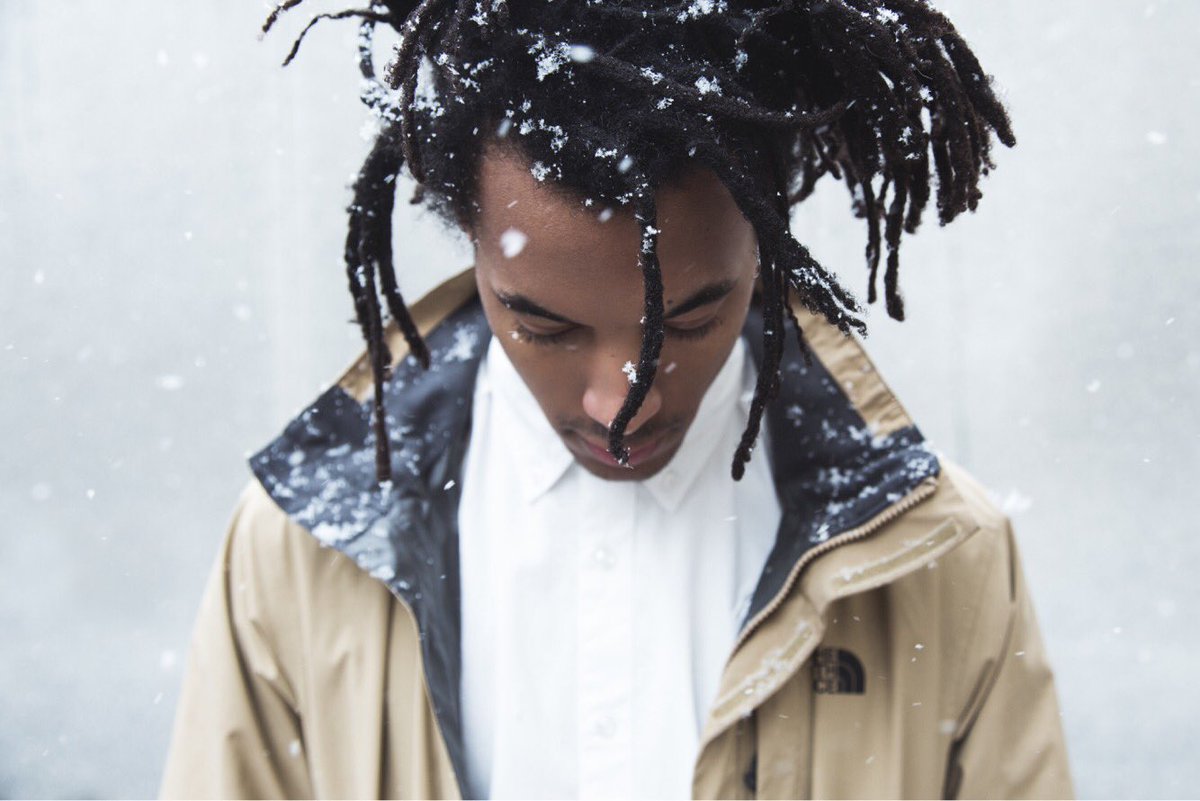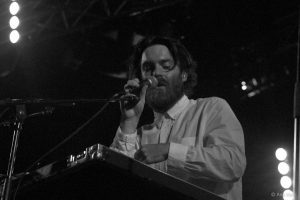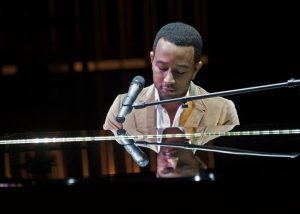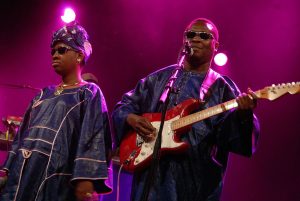Texas-native Conner Youngblood first started playing clarinet in his middle school band at the age of 12, but can now play anywhere from 15-20 different instruments. At 27 years old, Youngblood has released one EP and multiple singles and is currently at work on his first full-length album. Citing music inspirations such as Elliott Smith and Sufjan Stevens, movie-fanatic Youngblood also says film scores and film imagery influence his music.
The Voice had a phone interview with Youngblood ahead of his fall tour, which will include a stop at DC9 in Washington, D.C. on Oct. 7.
You can buy tickets here.
The following transcript has been edited for clarity and length.
The Voice: When did you start playing music and starting to write and what made you want to start?
Youngblood: It started probably around 12 playing guitar and playing clarinet in band, but I didn’t start writing until maybe around 16/17 and that was from being in a friend’s band for a while and enjoying doing it with him. I played a few shows with him, enjoyed it, and was just being a backup kind of guy on guitar and banjo. I never enjoyed singing until listening to my favorite music like Elliott Smith and Sufjan Stevens and you know singing along with their songs.
The Voice: After college, how did you know you wanted to get into music?
Y: I didn’t really apply to any jobs and [music] was kinda the plan all along. I moved to Nashville and started playing more shows. Originally I was going to do it with a band, we got a band together. The first few shows in Nashville were with those guys. And then I just kept going solo. I honestly didn’t know what else to do besides music and it kinda just worked out.
The Voice: You released your first few songs on SoundCloud and other platforms instead of releasing a full-length album, so I was wondering what your thoughts are on the importance of releasing albums/making sales/making music and the importance of it in today’s music industry?
Y: Well, it’s tricky to navigate through because originally I wasn’t anti-album, but I’d never prepared for it and didn’t see the importance in it and any time I wrote or recorded a song, I usually released it on SoundCloud that night. So, as soon as it was done, I was like oh cool, then released it. The hardest thing for me was just trying to save up [multiple songs to release in an album] because of that tendency to release things as soon as possible. And I saved up two groups of eight [songs] which were released. Sketches Part I and Sketches Part II were these EP kinda mixtape things for free. This was 2011 maybe, and those are just on MediaFire free downloads. I honestly haven’t released an album, and I’ve been doing this probably since 2010. I’ve now signed with a label for the first time this past year, so I’m actually doing the paperwork, working on my very first album, and it’s actually a pretty nice process.
The Voice: That’s exciting.
Y: It is pretty rewarding and I’m not even done with it yet so I can only imagine what it’ll be like to release it. But the only thing that’s not good is having to wait so long to show people the things you’ve been working on.
The Voice: How would you describe your sound?
Y: This is always the tricky question. Every song I get into is in a different state of mind and obviously my music is all gonna sound similar to each other because I’m the one playing it. In terms of describing the musical side of things, I’d say peaceful, singer-songwriter, with high-tech instrumentation and production.
The Voice: What instruments do you incorporate into your music?
Y: I used to try to use as many weird instruments as possible, not weird but some of the first things I recorded after senior year of high school [were] what kind of was an album that isn’t online anywhere–a group of ten songs and I didn’t use any guitar on any of them or piano. I was trying to just use strange things lying around my room or string instruments from around the world that I had or bought online. Recently, I’ve used electric guitar in a lot of the current stuff, a lot of bass clarinet. Drums, guitars, clarinets, horns, harps. A lot of the instruments I use aren’t really highlighted in any way that you would recognize what it is after all the production and strange effects I put on.
The Voice: And you do all your own production on the songs so far, right?
Y: Yes. It’s just me working with an engineer at the studio in Dallas, the same one I’ve been working with since high school.
The Voice: Where would you say that you draw inspiration from for your sound?
Y: I think of other people’s music and finding moments that I’ve really enjoyed—writing notes and keeping mental notes on things I want to try out or combine together. Sometimes, I’ll just think oh, it’d be cool to try out harp with this type of drum beat with these kind of vocals, this kind of vocal arrangement similar to this song or maybe try that similar feel of mixing and matching. Once a song is written, and the singing part of it is at least intact, you can just keep experimenting with the production side of things.
The Voice: Can you describe your songwriting process?
Y: Sometimes it starts with just a word or like I’ll name the song first before I’ve written anything. Recently, I’ve done a couple of songs that start off with me writing all the lyrics without even a melody, like a poem. Working on a beat I like and just trying it out, singing the words to it and seeing if they fit in a way that’s not awful-sounding. It ended up kind of working, but now they’re a little all over the place. It is kind of cool. Usually, they arise together. Like if I’m playing something on the guitar, I’ll write according to what I’m playing on guitar and vice versa and the songs and the guitar and the vocals sort of lead each other to the finish line. There’s a lot of different ways I’ve gone about it. Sometimes, I use the loop pedal and I go and just make beats. Then it’s me listening to the same four eight-bar loop in my room and just singing things over it, without any kind of chord changes or anything, just writing a song to a 20-second loop.
The Voice: I had seen something about how you draw information from film, so I wanted to ask about that.
Y: I want to get involved in film scores and work on film scores, and I watch more movies probably than listen to music. But things have inspired me from the movies just as much as the music in the movies—I just idealize or draw ideas or imagery [that] can inspire me just as much as other sounds. It’s definitely not necessarily the film score and the music as much as the certain feeling from the movie. I watch one or two a day. They’re on in the background while I’m recording all the time. I watch them almost every night before going to bed.
The Voice: Do you do the sketches that go along with each of the songs/EPs?
Y: I draw all those, usually one per song and one for the EP cover. It started with me trying to do architecture in school before I didn’t get into that program, and switched to American Studies. But at least I decided that I liked drawing because of that. I kept some of those drawings from class and used them for my artwork for songs and I’ve kept up with it since then.
The Voice: DC9 is a pretty small venue. Do you think your music comes across better in small venues?
Y: I wouldn’t say necessarily. It doesn’t make it any better or worse for me. (provigil) I mean as long as people are there enjoying it, that’s honestly what counts. At least if by smaller, you mean more intimate, I’d say yes. Sometimes I play outside festivals and that can get to be too much in the middle of the day with just a lot of stuff going, people wasted hanging out, wanting to rock out—I’m not that guy. Although I like playing festivals, I would say it [the music] comes across [better] in a quieter setting.
The Voice: How do you hope to continue evolving your sound?
That’s a tough thing for me that I’ve always been trying to figure out. I think I’ve just been naturally getting better which is one thing but I’m always listening to more new music—and by new, I mean new to me—so older and newer sounds that I then try out in my production. I push myself in terms of what I sing like because that can be the most monotonous-sounding thing if my vocals are the same of every song, every EP. It’s fun to try out just new ways—more aggressively, louder—and I’ve been trying a lot of different vocals out in the new songs.






